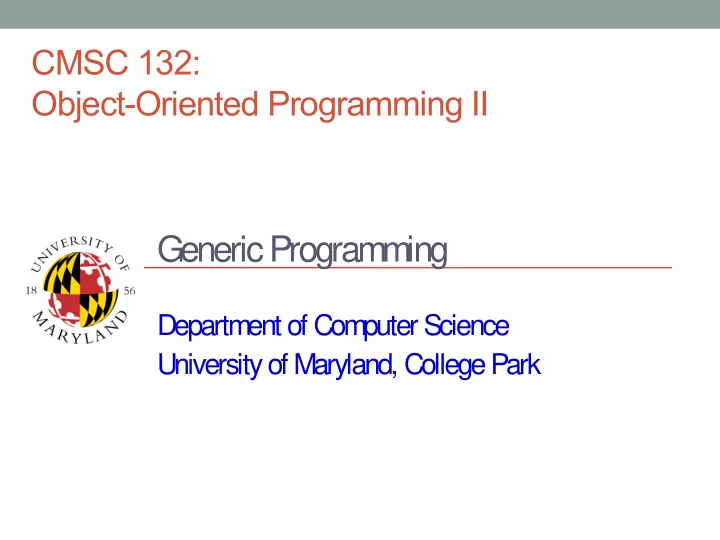

CMSC 132: Object-Oriented Programming II Generic Programming Department of Computer Science University of Maryland, College Park
Generic Programming • Generic programming – Defining constructs that can be used with different data types – I.e., using same code for different data types ● Example: stack operations the same regardless of stack element type • Implemented in Java through → A extends B – Inheritance → <A> – Type variables
Generic Programming Examples • Inheritance • Type Variables Class W<T> { Class A { doWork( T x ) { … } doWork( A x ) { … } } } Class A { … } Class B extends A { … } Class B { … } A w1 = new A( ); W<A> x1 = new W<A>( ); B w2 = new B( ); W<B> x2 = new W<B>( ); A w1 = new A( ); w1.doWork( w1 ); B w2 = new B( ); w2.doWork( w2 ); x1.doWork( w1 ); x2.doWork( w2 ); doWork( ) applied to objects of both class A and B
Generic Class • Class with one or more type variables – Example → class ArrayList<E> • To use generic class, provide an actual type – Valid types → ArrayList<String> ● Class → ArrayList<Comparable> ● Interface – Invalid types → ArrayList<int> ● Primitive type (use wrappers) → ArrayList<Integer>
Defining a Generic Class • Example public class myGeneric<T> { private T value; public myGeneric( T v ) { value = v; } public T getVal( ) { return value; } } • Append type variable(s) to class name using angle brackets ClassName<type variable> • Can use any name for type variable (but typically single uppercase letter → E, K, V, etc…) http://docs.oracle.com/javase/7/docs/api/java/util/Map.html – • Use the type variable to define type of variables, type of method parameters, method return type and object allocation • Arrays Type of an array object may not be a type variable or a parameterized type, – unless it is an unbounded wildcard type How to define arrays? – T[] data = (T[]) new Object [size]; ● • Example: Queue.java
Generics and Subtyping • In general if B is a subtype of A, and GT is a generic type declaration, it is not the case that GT<B> is a subtype of GT<A> • Example ArrayList<String> strL = new ArrayList<String>(); ArrayList<Object> objL = strL; // Illegal!
Generics and Subtyping • Consider what could happen if legal class A { … } class B extends A { … } // B is subtype of A List<B> bL = new ArrayList<B>(); List<A> aL = bL; aL.add(new A()); B b = bL.get(0); // runtime exception • Using String Class ArrayList<String> sL = new ArrayList<String>(); ArrayList<Object> oL = sL; // Illegal, but let’s assume is valid oL.add(new Integer(10)); String entry = sL.get(0); // Problem!!
Subtyping and Arrays • Subtyping works for arrays class A { … } class B extends A { … } // B is subtype of A A a = new B(); // B can be used where A expected B[] bB = new B[1]; A[] aB = bB; bB[0] = a; // won't compile • Using String Class Object value = new String("HI"); String[] sS = new String[1]; Object[] oO = sS; // Legal sS[0] = value; // It will not Compile • Example: Fruit.java, TropicalFruit.java
Wildcards • ? (unknown) – Collection<?> Collection whose element type matches anything ● • Bounded Wildcard Example: ArrayList<? extends Shape> – Unknown type that is Shape or subtype of Shape ● Notice the meaning of extends in this context ● • Summary <?> unknown type – <? extends typeExpression > unknown type that is typeExpression or a – subtype of typeExpression <? super typeExpression > unknown type that is typeExpression or a – supertype of typeExpression . typeExpression can involve further occurrences of wildcard type expressions – • Example: WildCard.java
Recommend
More recommend